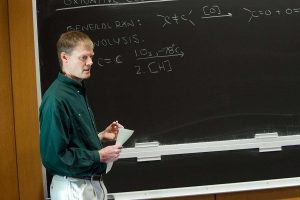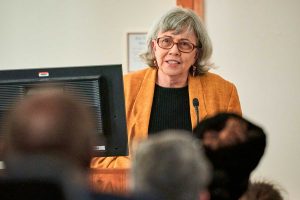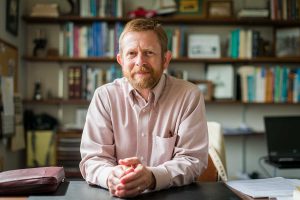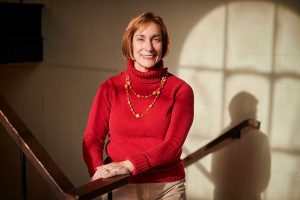Each year, endowed academic chairs and professorships provide resources that support the work of ▓žŠ½Ė¾ faculty members across campus. ▓žŠ½Ė¾ŌĆÖs Board of Trustees approved a new slate of endowed chairholders during its autumn meeting.
Professor of Chemistry Rick Geier is among this yearŌĆÖs honorees, taking on the Warren ŌĆÖ43 and Lillian Anderson Chair in Chemistry ŌĆö a title he will hold through June of 2029.
ŌĆ£I appreciate the recognition,ŌĆØ Geier said. ŌĆ£Professors at ▓žŠ½Ė¾ work hard on their teaching and scholarship in service to the institution, and mechanisms like endowed chairs recognize such efforts across the faculty. The research funds provide additional means for me to obtain supplies, travel to visit collaborators, travel to conferences, and support research students.ŌĆØ
Endowed positions are created through the generosity of the ▓žŠ½Ė¾ community. In his case, Geier singled out the Andersons for thanks, noting that, in addition to the chair he now holds, they have endowed summer research positions for students and provided funds to purchase a MALDI-ToF mass spectrometer. ŌĆ£This instrument is not a common resource at a predominantly undergraduate institution and we are fortunate to have it.ŌĆØ
Professors Jill Harsin (History), Timothy McCay (Biology and Environmental Studies), and Mary Moran (Anthropology and Africana & Latin American Studies) were also appointed to endowed chairs this year.
Moran will hold the title of Arnold A. Sio Chair in Diversity and Community through June 2020. Reflecting on the legendary professor of sociology and anthropology and namesake of the Sio Chair, Moran said, ŌĆ£I interviewed for a job at ▓žŠ½Ė¾ in December of 1984, and one of the faculty who met with me was Arnie Sio. I did not realize that he was interviewing me for his job. From the time I came as a very new faculty member, Arnie was a wonderful friend and mentor ŌĆö to be recognized with an endowed chair that honors ArnieŌĆÖs memory gives me a wonderful sense of a circle being completed.ŌĆØ
McCay, now Dunham Beldon Jr. Chair of Natural Sciences, also reflected on the impact of mentorship. ŌĆ£This honor means a great deal to me because I am following in the footsteps of Professor of Geology Rich April, a colleague who has been a valued friend and mentor since my early years at ▓žŠ½Ė¾,ŌĆØ McCay said. ŌĆ£Rich balanced transformative teaching with rigorous research and wise governance. I look to RichŌĆÖs example for inspiration, and deeply appreciate the generosity of Dunham Beldon Jr. in establishing this endowed professorship,ŌĆØ McCay said.
The Thomas A. Bartlett Chair, taken up by Harsin, was named in honor of ▓žŠ½Ė¾ŌĆÖs 11th president. ŌĆ£I will use the resources of the chair to further my research,ŌĆØ Harsin said. ŌĆ£And I will try to live up to the ideals of service and community embodied in the deed of gift ŌĆö the call to ŌĆśreflect former President BartlettŌĆÖs career as a diplomat, public servant, university administrator, and leader of higher education associations.ŌĆÖŌĆØ
Extending congratulations to her colleagues following the conferral of chairs, Provost and Dean of the College ŌĆÖ87, MAŌĆÖ90 said, ŌĆ£These are well-deserved appointments. The efforts made by these four faculty members ŌĆö both as researchers and as educators ŌĆö demonstrate the best of ▓žŠ½Ė¾ and this universityŌĆÖs commitment to academic rigor in all its forms.ŌĆØ
More on this yearŌĆÖs endowed chair appointees:
Richard Geier, Professor of Chemistry and Warren ŌĆÖ43 and Lillian Anderson Chair in Chemistry

An organic chemist who also teaches nanotechnology, G. Richard Geier received his PhD in chemistry from the University of Washington. He joined the ▓žŠ½Ė¾ faculty in 2000, following a research appointment at North Carolina State University. He has served as chair of the chemistry department and has also led the Wales Study Group. He was a visiting scholar at Rensselaer Polytechnic Institute in 2004, was promoted to associate professor at ▓žŠ½Ė¾ in 2006, and full professor in 2014.
In the classroom, Geier is praised for his organization, clarity, and his high standards. In his research he develops novel methods for synthesizing porphyrinic macrocycles, and his publications are well-known for their attention to detail, innovation, and quality. They reveal a steady output of scholarship with sustained involvement of ▓žŠ½Ė¾ students, who appear as coauthors, and a consistent dedication to upgrading departmental facilities through contributions to NSF-MRI grants. He is well-known for his unselfish service to the university, serving in many committees and capacities. Most notably, Geier co-led the successful Middle States Accreditation Review.
Thomas A. Bartlett Chair and Professor of History Jill Harsin

Jill Harsin holds a PhD from the University of Iowa. She joined the ▓žŠ½Ė¾ faculty in 1982 as a scholar of French social and gender history. Her specialties are in European history, the history of France and the French Revolution, and womenŌĆÖs history. She has both published in and served on the editorial board of the premier journal French Historical Studies. Her book The War of the Streets: Honor, Masculinity, and Violence in Republican Paris presents a narrative history of the turbulent July Monarchy, which encompassed two successful revolutions, three Paris insurrections, and seven assassination attempts against the king and his family.
Harsin has served in many important capacities at the university, including chairing the history department and serving on the Committee on Promotion and Tenure, the ▓žŠ½Ė¾ Research Council, the Personnel Review Committee, and the search committee for the Chief Financial Officer and Treasurer. Most notably, she has served as interim dean of the faculty and interim university president. She currently serves as a chair of the Bicentennial Committee.
Professor of Biology and Environmental Studies and Dunham Beldon Jr. Chair of Natural Sciences Timothy McCay

Timothy McCay holds a PhD in ecology from the University of Georgia. He came to ▓žŠ½Ė¾ in 1999 as a lecturer and research associate in university studies and joined the tenure stream in the department of biology the next year. He was promoted to full professor in 2014 and served three years as chair of the department. In 2009, he received a joint appointment with the Environmental Studies Program, where he has also served as director.
McCayŌĆÖs teaching interests are in ecology, biostatistics, vertebrate animals and natural resource conservation. His outstanding teaching led students to select him as the 2003 Phi Eta Sigma Professor of the Year. He sees himself as a terrestrial ecologist, with interests in two groups of animals: shrews and earthworms, and more recently, the buckthorn, an exotic plant. He is also interested in acid rain and the forest-floor ecosystem, which studies the habitat in the forestsŌĆÖ fallen-wood floor. He has received a number of external grants and has participated in interdisciplinary collaborations that bring together biologists, geologists, geographers and other scientists. He has published consistently with ▓žŠ½Ė¾ students in his projects. He has also served the university on numerous committees and in taking a leadership role in connecting disciplines under the Environmental Studies Program.
Professor of Anthropology and Africana & Latin American Studies and Arnold A. Sio Chair in Diversity and Community Mary Moran

Mary Moran holds a PhD in anthropology from Brown University. At ▓žŠ½Ė¾, she teaches courses in anthropology and African studies at all levels of the curriculum. Her specialized upper-level courses include Political Anthropology, Gender and Society in Africa, and Gender and Society. Since 1982, she has conducted ethnographic field work in the West African nation of Liberia, focusing on a small southeastern region inhabited by the Grebo people. Her most recent research focuses on the larger process of gender transformation in Liberia.
MoranŌĆÖs work has appeared in such publications as African Studies Review and Anthropology Quarterly. She has served as chair of the Association for Feminist Anthropology and on the executive board of the American Anthropological Association. On campus, she has served as the coordinator of African studies, director of the Core Cultures (now Communities and Identities) component, and chair of the Department of Sociology and Anthropology.
